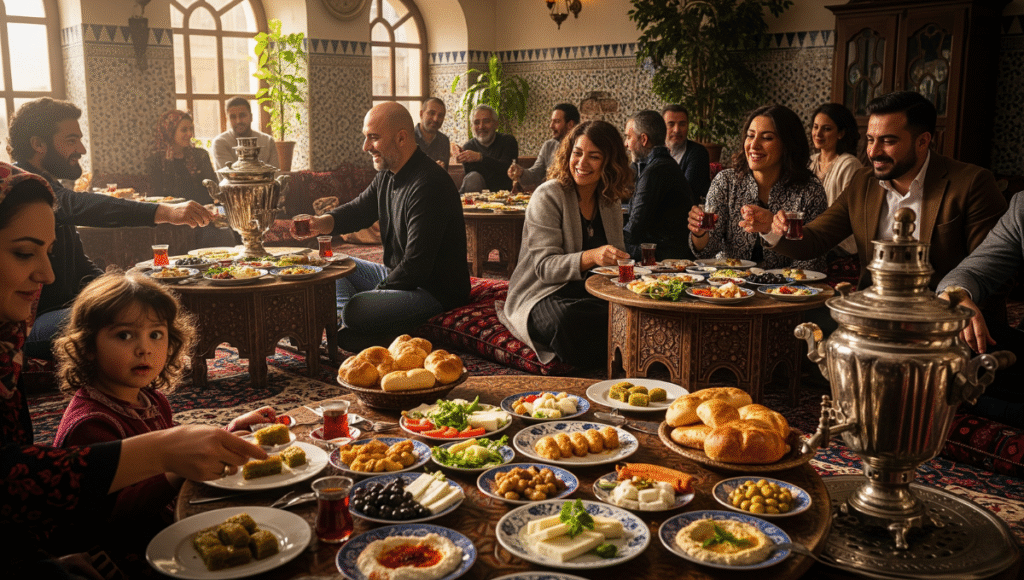Turkey is a land where history, culture, and tradition seamlessly intertwine. Among the many customs that define the Turkish way of life, Çeciir stands out as a symbol of hospitality, warmth, and community connection. More than just a ritual, Çeciir reflects the Turkish philosophy of welcoming guests, honoring relationships, and preserving cultural heritage.
In this article, we explore the meaning, history, and significance of Çeciir, as well as its role in modern Turkish society, showing why it is considered more than just a tradition.
What is Çeciir?
Çeciir is a traditional practice deeply embedded in Turkish culture, symbolizing generosity and the art of hospitality. The word itself is rooted in regional dialects, and while its specific interpretations may vary across Turkey, its essence remains the same: to honor guests and strengthen social bonds through thoughtful gestures and shared experiences.
This practice often involves:
-
Offering drinks or food to visitors
-
Engaging in meaningful conversation
-
Creating a welcoming environment for friends, family, and even strangers
The Historical Significance of Çeciir
Hospitality has been central to Turkish culture for centuries, influenced by Ottoman traditions and earlier Anatolian civilizations. Çeciir evolved as part of a broader cultural emphasis on treating guests with respect, generosity, and attention to detail.
Historically, Çeciir was not just a social courtesy but also a reflection of:
-
Social Status – Demonstrating one’s respectability and refinement
-
Cultural Identity – Reinforcing community values and customs
-
Interpersonal Bonds – Strengthening relationships among families and neighbors
Even today, these values resonate strongly in Turkish society, illustrating the enduring legacy of hospitality in the region.
How Çeciir is Practiced Today
While modern life has introduced new ways of connecting, Çeciir remains a living tradition in homes, businesses, and public spaces across Turkey. Today, its practice may include:
-
Inviting Guests Over – Whether for tea, coffee, or a meal, hosting remains a central act of Çeciir.
-
Serving Traditional Treats – Sweets, pastries, or regional delicacies are often presented to guests as a sign of respect.
-
Creating a Welcoming Atmosphere – Clean, organized, and comfortable spaces reflect thoughtfulness and care.
-
Engaging in Conversation – Hospitality is as much about listening and connecting as it is about offering food or drink.
In urban areas, hotels, restaurants, and cafes may also incorporate Çeciir principles, extending this sense of warmth to visitors and tourists.
Cultural and Social Importance
Çeciir is not just about etiquette—it represents deeper cultural values that define Turkish society:
-
Community Connection – Encouraging people to bond, share, and support one another
-
Respect and Courtesy – Teaching younger generations the importance of generosity and empathy
-
Preservation of Tradition – Ensuring that cultural practices are passed down and celebrated
-
Identity and Pride – Reinforcing a sense of belonging and pride in Turkish heritage
By practicing Çeciir, individuals participate in a cultural narrative that goes far beyond hospitality—it’s a reflection of societal values and shared history.
Çeciir in Everyday Life
For many Turks, Çeciir is woven into everyday life:
-
Home Visits – Bringing sweets or small gifts when visiting friends or relatives
-
Festivals and Ceremonies – Demonstrating hospitality during weddings, religious celebrations, or national holidays
-
Workplace Culture – Hosting colleagues or clients with coffee or snacks as a gesture of goodwill
Even small acts, such as offering tea to a neighbor or welcoming someone into your home, are considered part of this rich tradition of hospitality.
The Modern Relevance of Çeciir
In an era of fast-paced lifestyles and digital communication, Çeciir offers a reminder of the value of personal connection. It encourages slowing down, being present, and nurturing relationships.
Modern Turks continue to embrace Çeciir by:
-
Hosting gatherings that combine tradition with contemporary lifestyles
-
Incorporating cultural elements into businesses to enhance customer experience
-
Educating younger generations on the importance of generosity and respect
This shows that Çeciir is not just a relic of the past—it’s a living, evolving practice that remains relevant in today’s world.
Why Çeciir is More Than Just a Tradition
Çeciir embodies far more than hospitality—it reflects:
-
Cultural Identity – A way to connect with Turkish heritage
-
Social Responsibility – Encouraging kindness and community support
-
Emotional Connection – Strengthening bonds between families, friends, and neighbors
-
Timeless Values – Teaching respect, generosity, and empathy across generations
It is a reminder that small gestures can have profound cultural significance, making the everyday act of welcoming someone a powerful expression of Turkish values.
Conclusion
Çeciir is a cornerstone of Turkish hospitality and culture, offering a unique lens through which to understand the warmth, generosity, and community spirit of Turkey. Far from being a simple tradition, it is a living practice that strengthens social bonds, preserves cultural identity, and fosters meaningful human connection.
Whether experienced in a cozy home, a bustling café, or a family celebration, Çeciir serves as a timeless symbol of what it truly means to welcome, respect, and honor others. For anyone seeking to understand Turkish culture, embracing or observing Çeciir is a beautiful starting point.

